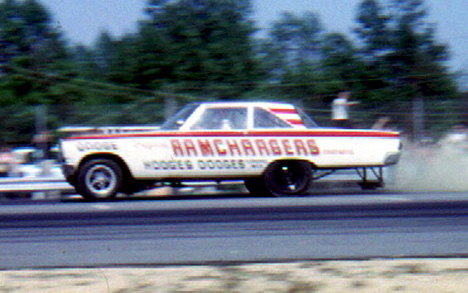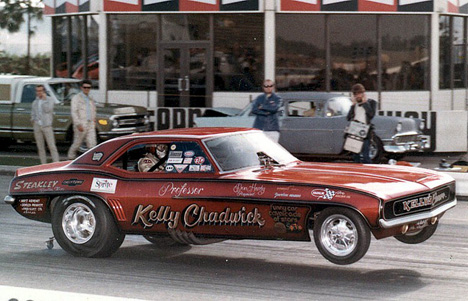By Danny White

Bruce Larson was one of the best Chevrolet funny car racers of all time. The “USA-1” 1967 Camaro was the second funny campaigned by Larson. It was one of the best in the northeast. The car featured a Logghe Stage II chassis and a 427 Chevrolet engine backed by an automatic transmission. The Camaro held the NHRA National record at 7.41 seconds in 1968. The “U.S.A.-1” 67 Camaro raced until 1969. Larson now makes exhibition runs with the restored car. (Photos provided by Mike Ditty; info provided by James Ibusuki and www.draglist.com)

“Fast Eddie” Schartman was one of the racers chosen to receive one of the Logghe-built Comets from Ford Motor Company. Schartman had worked his way up the racing ranks before getting into funny car racing. In 1966, he was among the top funny car racers with the far-advanced Comets. In 1967, he was already on his third paint job when he received the Air Lift sponsorship. The Air Lift Rattler featured the updated Logghe chassis and kept on winning. With Amos Satterlee tuning, Schartman won the Manufacturer’s Funny Car Championship at Orange County. The car ran a best of 7.73 at 185, according to Draglist files. (Photo provided by Drag Racing Memories; info from www.draglist.com)

Dickie Harrell was the model drag racer of the 1960s. His race cars were immaculate, his car haulers were kept clean, and Harrell’s interaction with sponsors and fans was second to none. Known as “Mr. Chevrolet,” Harrell was one the most successful racers in AHRA drag racing history. Dick raced a series of stockers, super stockers, and factory experimentals until reaching the funny car ranks.
Many felt his best funny car was the Fred Gibb-sponsored 1969 Camaro. Don Hardy built the car in his Floydada, Texas, shop. The Camaro featured a 427 Chevrolet Rat for power backed by an automatic transmission. The car won many match races during 1969, running a best of 7.35 at 200 MPH plus. (Photo provided by Drag Race Memories; info from James Ibusuki and www.draglist.com files)

The “Ramchargers” were a famed drag racing team that helped to develop the funny car class in the sixties and well into the seventies. The “Ramchargers” were a group of Chrysler engineers that raced on the side using the best of Chrysler engineering. The team ran a series of race cars, including an altered ’49 Chrysler to a plethora of stockers and super stockers. Within the group of the Ramchargers that included Dick Maxwell, Tom Hoover, Phil Goulet, Don Westerdale, Jim Thornton, and many others began the early development of the funny car.
The Ramchargers were among the first teams to have the 2% Super Stockers. The 2% led to the next stage of the radical altered wheelbase funny cars. The Coronet in the photos is said to be one of the first FCs into the eights if not the first-ever! Jim Thornton drove the car to a great 8.925, 150.75 at Cecil County in 1965. The Coronet was feared by many, and rightly so. The car was one of the first well-known funny cars and one of the stars of the first Super Stock Nationals in York, PA, in 1965. (Photo provided by Drag Racing Memories; info provided by James Ibusuki and www.draglist.com)

Pat Foster is a famous chassis builder of many funny cars from the 1960s into the 1980s. Foster also drove many funny cars, including the Mickey Thompson Mach I in 1969. The car was the sister car to the one Danny Ongais drove. Foster built both cars, revolutionizing funny car racing in 1969 with his chassis design. The cars were lighter than their competition, which gave them a distinct advantage over the other funny cars during the first half of the season. The competition started to transition to pure funny car chassis to keep up with Foster’s machines.
While Ongais went on a winning spree, Foster had a series of gremlins that kept him from winning. The car showed potential with a 6.99 clocking along with a reported 215.31 mph blast at Kansas City. But fate stepped in when Pat Foster was involved in a two-car accident with Gerry Schwartz at Dallas International during the NHRA Springnationals. Schwartz did not survive the crash. Foster continued to build funny cars and became a national event-winning driver. (Photo provided by Drag Racing Memories; info provided by James Ibusuki and www.draglist.com)

Don Gay, like Arnie Beswick, was a tried and true Pontiac racer. Dubbed the “Texas Teenager” by the drag racing press, Gay started racing stockers and super stockers when he was barely legal to drive out his father’s Pontiac dealership. Don Gay’s father not only bought racecars for his sons Don and Roy, but he also bought Houston International Dragway. In 1964, the Gays built their first funny car out of a GTO.
That car was replaced by an all-new ’65 GTO for Don, and the old car was passed on to Roy. The Gays contracted famed racer Jay Howell to build the new car, an all-fiberglass machine with a complete tube chassis. The 421 Pontiac in the “Infinity” GTO was built by James Osteen, who was hired to oversee the Gay’s racing operation. Don match raced regularly at Houston International and toured across the country. The beautiful GTO ran deep into the eights. (Photo provided by Drag Racing Memories; info from www.draglist.com)

“Big John” Mazmanian is known for having great-looking cars that also ran great. Mazmanian ran a series of gassers and funny cars, all in his trademark Candy Apple Red. Big John’s first funny car was a stunner. The ’68 Barracuda featured deep shades of Candy Apple Red with real gold leaf lettering. Pat Foster built the chassis, and a 426 Chrysler powered the car. Rich Siroonian, Big John’s nephew, drove the beauty. The team took its biggest win at the 1968 Manufacturer’s Funny Car Championships at Orange County, defeating Don Schumacher in the final. Siroonian’s best times in the car were 7.30 at 192, according to Draglist files. (Photo provided by Drag Racing Memories; info provided by James Ibusuki and www.draglist.com)

By the time Larry Reyes began driving the “Hawaiian” in 1969, he was a true funny car standout. Reyes had driven the “Super Cuda” Barracuda, the “King Fish” Barracuda, Larry Coleman’s Coronet, Phil Bonner’s “Daddy Warbucks,” and his own Barracuda. Reyes became the first of many funny car drivers for Roland Leong, who jumped on the funny car bandwagon after having success in dragsters with such drivers as Don Prudhomme, Mike Snively, Mike Sorokin, and Danny Ongais. Leong had a Logghe-built Stage II chassis with a full-size Ron Pellegrini-built Charger body, and Keith Black built the engine. The car literally flew at Pomona, signaling the end of the full-size funny car.
Leong debuted a new mini Charger shortly after that. The new “Hawaiian” won all three races it entered the first weekend with Reyes driving. Reyes drove the car to a reported best of 7.35 at 208.31 by the end of 1969. Larry left Leong and later drove for Candies and Hughes, Prock and Howell, and the last “Super Cuda.” Reyes suffered an accident at the wheel of the “Super Cuda” that left him in a wheelchair. Larry returned to race 20 years later in Super Gas. Leong went on to race and tune funny cars for the next 25 years with a seemingly endless list of drivers. (Photo provided by Drag Racing Memories; info from James Ibusuki and www.draglist.com)

Kelly Chadwick is well-known in two different fields. In Texas, Kelly is well known as a girl’s basketball coach. Chadwick is also known as a premier drag racer in Texas and beyond. Kelly worked his way through a series of race cars until he reached the funny car ranks. Don Hardy built all of Kelly Chadwick’s cars, including the pictured Camaro. The beautiful ’69 Camaro was Chadwick’s third funny car and his first with a flip-top tube chassis. Kelly had raced the “Wild Thing I” Chevy II and the “Wild Thing II” Camaro, mainly in the southwest.
The 1969 Camaro was the first car he took on a national tour. Chadwick joined the original Coca-Cola Cavalcade of Stars and was said to be the champion in 1969. The Camaro’s best times were 7.10 at 209 by the end of 1970. (Photos provided by Drag Racing Memories; info provided by James Ibusuki and www.draglist.com files)

The Corvair of Doug Thorley is one of the best-remembered funny cars of the sixties. It was known both for its performance and its looks. The Corvair replaced the “Chevy II Heavy” 65 Chevy II. The new Pat Foster-built piece had tinted Plexiglas windows, a lace paint job, and gold-painted Halibrand mags. The car was the poster child of late 60s fads.
Doug Thorley had one of the great weekends of his career at Indy ’67. The Doug’s Headers Corvair ran 7.69 to win the race over several Hemi-powered machines. The 7.69 run and Indy win were the high points of Thorley’s funny driving career. The notoriety from the win led to Thorley getting a deal with American Motors to build a rear-engine funny car, but the AMC machines never reached the success of the Chevy. (Photo provided by Mike Ditty; info from www.draglist.com)